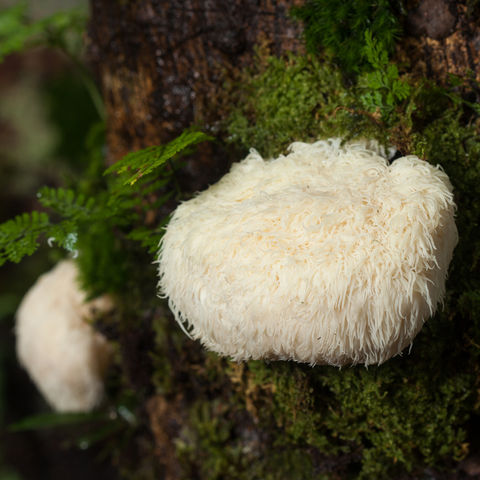Your Cart is Empty
FREE SHIPPING ON ALL ORDERS $75+
If you’re in tune with the world of wellness supplements, you probably see lion’s mane mushroom gaining a lot of traction. But what is lion’s mane good for?
Well, this functional fungi is known as the “mushroom for the mind” thanks to its potential cognitive-boosting benefits. Here, we’ll break down Lion’s Mane many potential benefits, how supplements are used, and exactly how to choose the best one. Let’s get started:

Lion’s Mane is known as a delicacy cuisine in some parts of the world, but even it’s therapeutic benefits can be traced back to ancient medicine records. At the time, it’s brain boosting benefits were mostly anecdotal, but modern research has shed even more light on Lion's Mane's potential benefits and uses. Now, we know much more about the composition of Lion’s Mane and how it can impact our health.
Fungi like Lion’s Mane are composed mostly of polysaccharides, or complex carbohydrates, divided into two categories–alpha-glucans and beta-glucans.
Alpha-glucans provide sustainable energy to the body, while beta-glucans are the more bioactive compound that may be responsible for many of the health benefits associated with the mushroom. Lion’s Mane contains at least 35 completely unique beta-glucans which is why it may be responsible for such a wide range of health benefits.
Lion’s Mane also contains many different terpenoids, a modified classification of terpenes. These are lipids that are often associated with the fragrance of many plants, but they also carry unique benefits of their own. So what do these therapeutic compounds really do for the body? According to research, here’s are some of the key benefits we know about:
A 2012 study described Lion’s Mane’s antioxidant activity as “moderate to high.” Antioxidants help fight free radicals in the body. Free radicals, when left unchecked, cause inflammation and attack cells and tissues, which can lead to a number of different health conditions, like autoimmune disease.
Because of its antioxidant properties, it may also protect against tissue death caused by free radicals in the brain, which is thought to be the cause of neurodegenerative issues like Alzheimer’s. However, Lion’s Mane’s brain boosting benefits may go even further according to a 2017 study suggests that Lion’s Mane supplementation potentially increased object recognition and memory in mice. One older study evaluated the benefits of the medicinal mushroom on cognitive performance in older adults. This research concluded that daily consumption of mushroom extract for 4 months improved cognitive performance in adults between 50 and 85 years of age compared to the placebo control group. The cognitive performance scores decreased after discontinuing the extract.
One study found that Lion’s Mane extract may encourage the growth of new nerve cells and may stimulate faster healing within in the nervous system. Another study found that daily doses of Lion’s Mane extract resulted in faster nerve regeneration in rats with nerve damage compared to control subjects.
Aside from all of these benefits, some research suggests that Lion’s Mane may have potential in other areas as well, including:
Read Lion’s Mane Benefits to learn more.
Now that you know what lion’s mane is food for, you’re probably wondering–how do I take it? Let us answer your questions:

Since it’s generally used to enhance cognition, the morning is usually the best time to take Lion's Mane. Of course, you can integrate Lion’s Mane into your schedule wherever it fits best–taking it daily is most important.
However, it’s a misconception that Lion’s Mane will give you any immediate energy boosts. Instead, the benefits from Lion’s Mane will build over time after daily use. Studies typically involve routine daily doses, and some have shown that the cognitive benefits of Lion’s Mane do not persist after stopping the daily doses.
As with all wellness supplements, it’s important to consider the quality of the Lion’s Mane you choose. You need to consider things like whether to choose a supplement made from the fruiting body or mycelium, whether to choose a whole mushroom powder or an extract, and the general quality standards used by the company you choose.
If you want a lion’s mane supplement with the most balanced therapeutic and cognitive benefits, look for a mushroom extract powder made from the mushroom’s fruiting body. Also ensure that the products are made in an FDA approved facility using high-quality (ideally organic) ingredients.
Then benefit of choosing an extract powder vs a whole mushroom powder is that the beta-glucans and other bioactive compounds are already bioavailable in an extract. In a whole mushroom powder, the beta-glucan content has not yet been extracted and is instead still locked away in the mushroom’s chitin, a protective polymer that the body cannot break down.
Extracts need no extra steps. You simply consume them however you please--in a beverage, in your food, or as a capsule.

Lion’s Mane, the “mind mushroom” has a slew of anecdotal and research-backed benefits that make it a useful part of a daily wellness regimen. Aside from it’s primary benefit–it’s potential ability to boost cognition–it may also provide adaptogenic benefits similar to other functional mushrooms. Plus, Lion’s Mane is a superfood that’s full of nutritional goodness. A mushroom extract powder, especially a blend of functional mushroom powders, could be exactly the brain and body boost you need to get through your day.
To learn more about Lion’s Mane, you may also want to read:
Comments will be approved before showing up.



